Some Blogs
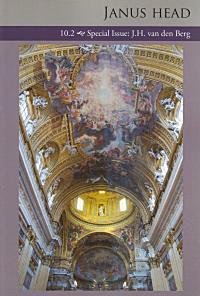 Janus Head Janus Head
10.2
Special Issue
J.H. van den Berg

Travels Inside the Archive
Robert Gibbons
Edge of Maine Editions

Beyond Time
New & Selected Work
1977 - 2007
Robert Gibbons
 The Age of Briggs & Stratton The Age of Briggs & Stratton
Peter Culley
|
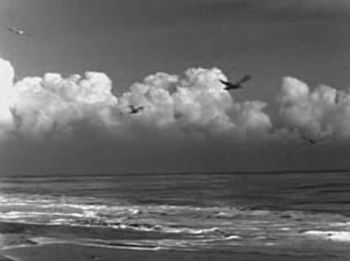
Moods of the Sea
Slavko Vorkapich and John Hoffman
Felix Mendelssohn
(1941)10-min.
ubuweb
_______________________
The Graveyard By The Sea
Paul Valéry
Translated by C. Day Lewis
This quiet roof, where dove-sails saunter by,
Between the pines, the tombs, throbs visibly.
Impartial noon patterns the sea in flame --
That sea forever starting and re-starting.
When thought has had its hour, oh how rewarding
Are the long vistas of celestial calm!
What grace of light, what pure toil goes to form
The manifold diamond of the elusive foam!
What peace I feel begotten at that source!
When sunlight rests upon a profound sea,
Time's air is sparkling, dream is certainty --
Pure artifice both of an eternal Cause.
(....)
I am the only medium for your fears.
My penitence, my doubts, my baulked desires --
These are the flaw within your diamond pride . . .
But in their heavy night, cumbered with marble,
Under the roots of trees a shadow people
Has slowly now come over to your side.
(....)
The wind is rising! . . . We must try to live!
The huge air opens and shuts my book: the wave
Dares to explode out of the rocks in reeking
Spray. Fly away, my sun-bewildered pages!
Break, waves! Break up with your rejoicing surges
This quiet roof where sails like doves were pecking.
...(more)
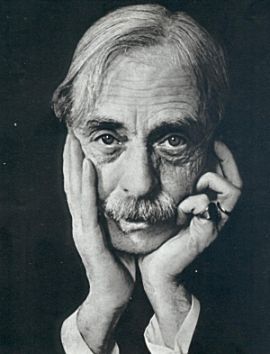
Paul Valéry
October 30, 1871 - July 20, 1945
"God made everything out of nothing, but the nothingness shows through."
-
Paul Valéry
Selected Writings of Paul Valerygoogle books
Paul Valéry on Poetry in Translation
translated by Denise Folliot
Crisis of the Mind
Paul Valéry
(1919)
...in the same disorder of mind, at the summons of the same anguish, all cultivated Europe underwent the rapid revival of her innumerable ways of thought: dogmas, philosophies, heterogeneous ideals; the three hundred ways of explaining the World, the thousand and one versions of Christianity, the two dozen kinds of positivism; the whole spectrum of intellectual light spread out its incompatible colors, illuminating with a strange and contradictory glow the death agony of the European soul. While inventors were feverishly searching their imaginations and the annals of former wars for the means of doing away with barbed wire, of outwitting submarines or paralyzing the flight of airplanes, her soul was intoning at the same time all the incantations it ever knew, and giving serious consideration to the most bizarre prophecies; she sought refuge, guidance, consolation throughout the whole register of her memories, past acts, and ancestral attitudes. Such are the known effects of anxiety, the disordered behavior of mind fleeing from reality to nightmare and from nightmare back to reality, terrified, like a rat caught in a trap. (...)
. . The military crisis may be over. The economic crisis is still with us in all its force. But the intellectual crisis, being more subtle and, by it nature, assuming the most deceptive appearances (since it takes place in the very realm of dissimulation)...this crisis will hardly allow us to grasp its true extent, its phase....(more)
_______________________
Meta-currency:
a step towards the Rheonomy
Eric Harris-Braun
In her beautifully insightful book, The Nature of Economies, Jane Jacobs suggests that we must broaden our understanding of economics in the context of the flow processes of the natural world. Near the end of the book one of her characters asks the question, “What are economies for?” One of the other characters answers:
“… To enable us to partake, in our own fashion, in a great universal flow”
Another character answers with “Economies have a lot in common with language… like language, economic life permits us to develop cultures and multitudes of purposes… that’s its function which is most meaningful for us.”
What do we mean by economy when we say “the economy is strong/weak/growing/shrinking/healthy/in crisis.” We mean something social, an aggregate of many people interacting. But it’s not just individuals, it’s groups of people in the form of businesses, governments, unions, non-profits, etc. also interacting with each other and with individual people. We know, however, that we aren’t necessarily talking about the entire social organism for when the economy falters, other aspects of the social organism, i.e. its arts-culture may thrive. Or, the economy may flourish while we experience a marked drop in “civility” or an increase in other so called “social problems”. “Economy”, it seems, specifically refers to the body of the social organism — its “corporeal” aspect. This includes moving stuff around, building houses, growing food, transforming nature to its bodily needs, etc. Using this analogy, we might say that the mind of the social organism is everything else — its cultures, religions, arts, politics, and so on.
However, it would be a mistake to project this mind/body dualism onto our nascent understanding of the social organism, thereby forming a dis-integrative framework from the start. So it’s not just that the economy is disintegrating around us, it’s that the very word and concept of economy is disintegrative! Here, the two answers given by Jacob’s characters are so powerful. First, they help us shift our imaginations toward thinking from the point of view of the social organism; toward seeing that the “us” that partakes in the great universal flow, and the “us” that develops cultures and multitudes of purposes is not the individuals of the social organism, but rather the social organism itself. Second, they suggest a perspective from which to perceive the organism as a unity: as a participant in the “great universal flow.” Third, they suggest to how this participation is achieved: through language and expressive capacity. ...(more)
via Gift Hub
_______________________
Ancient Music
Winter is icummen in,
Lhude sing Goddamm.
Raineth drop and staineth slop,
And how the wind doth ramm!
Sing: Goddamm.
Skiddeth bus and sloppeth us,
An ague hath my ham.
Freezeth river, turneth liver,
Damn you, sing: Goddamm.
Goddamm, Goddamm, 'tis why I am, Goddamm,
So 'gainst the winter's balm.
Sing goddamm, damm, sing Goddamm.
Sing goddamm, sing goddamm, DAMM.
-
Ezra Pound

Ezra Pound
October 30, 1885 – November 1, 1972
Vortograph
Alvin Langdon Coburn
1882 - 1966
ABC of reading
Ezra Pound
google books
The cantos of Ezra Pound
google books
Personae: The Shorter Poems of Ezra Pound
google books
Masks
Ezra Pound
These tales of old disguisings, are they not
Strange myths of souls that found themselves among
Unwonted folk that spake an hostile tongue,
Some soul from all the rest who'd not forgot
The star-span acres of a former lot
Where boundless mid the clouds his course he swung,
Or carnate with his elder brothers sung
Ere ballad-makers lisped of Camelot?
Old singers half-forgetful of their tunes,
Old painters color-blind come back once more,
Old poets skill-less in the wind-heart runes,
Old wizards lacking in their wonder-lore:
All they that with strange sadness in their eyes
Ponder in silence o'er earth's queynt devyse?
-
_______________________
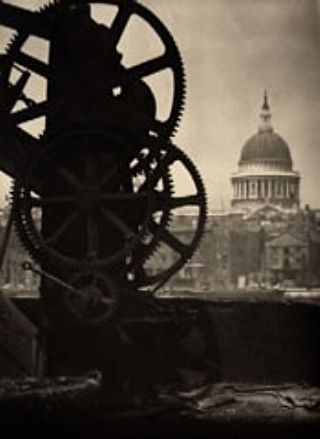
St Paul's Cathedral and Cog
Alvin Langdon Coburn
1905 Alvin Langdon Coburn - Yosemite Series
Alvin Langdon Coburn - Edinburgh Series 135 Images
George Eastman House
_______________________
Three Poems
Jett McAlister
conjunctions
The Silent Days
1
Hunt and peck, hunt and peck the air here
Would that I were a river or a man of fewer words than this
Go to the fields they smell of bergamot and the mud
cold and ankle-deep
Beyond all this, there is a wall beyond which the dark
Watch the day smoke from the heather
Let the wall stand until I cannot climb
2
The tea-kettle boils the crow in the neighbor’s yard
another brushstroke, another turn
Sky veers yellow first petal falling from the magnolia tree
3
What wind there was whipped my hair and face
I waited out the hours in the dark I waited underneath
We hope for ourselves, for the grasses and the trees
Follow this to the west
Have you tasted it, this ash that fills the air the thrush
Still life on a table: a book, my glasses, my watch, upended
4
These days, it’s all splayed out for us looped and relooped
...(more)
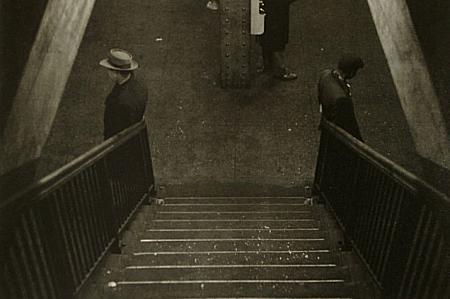
Roy DeCarava
1919-2009
_______________________
As language. . .
As language. . .Silence is also a language.
When there is no order in heaven
we make what we make
by luck, or strength,
or the composition of desire.
Power grows
like vegetation,
and there are no preferences under heaven.
I do not know why a leaf should be of less worth
than a Vatican,
or why builders care.
The mathematical stones recite their logic
of cruelty and despair
we arose to gratify some searchless reason
shaping the empty air.
Louis Dudek
(1918 - 2001)
_______________________
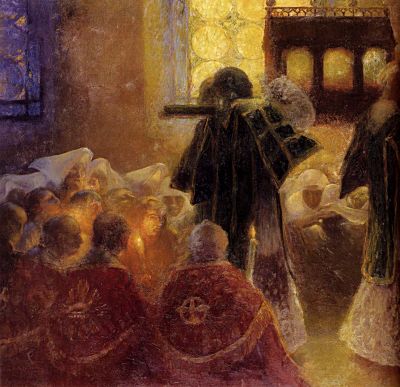
The Relics
1899
Gaston La Touche
October 29, 1854 - July 12, 1913
_______________________
Tangled Reliquary
Ann Lauterbach
Tangled reliquary under all surfaces.
Nothing moonlike occurs there
Only partial coves
And entrances.
How cool it must have been
the vat of the previous
Before these habits ordained the real.
Some of us must have seen each other
Naked in opulent dawn, our nerves
Drawn up as from an ancient well
Mossy, slick, unstuck at every seam
So we enter the sleeve of history
Out of which the magician pulls
His lawn ornaments: Dancer, Prancer,
Our Lady of Provocations, flags, targets,
The bluebird's house.
On the adjacent field
A swarm of butterflies alights
On a bald tree. This is the Tree of Changes
Mentioned in the lost book of A.
Her auspice was a riddle,
Sphinx or no sphinx,
Whose meanings we can piece together
From her journals which were torn into bandages
To wrap the wounds of the dying.
Such wanton songs
Paginate empirical trust
And the ruse of the first place.
Not that story again, what we cannot say
To the sun as it dispenses its sheen
Out over the harbor, but only
How can you perform your agile sway
Without shelter and without us?
So the riddle of the disembodied name
Sets in motion its primal mischief
Sanctioned and forbidden in the vastly gone.
...(more)
Ann Lauterbach at PennSound and The Poetry Foundation
_______________________

Hellebore for Georg Trakl
R.B. Kitaj
b. Oct. 29, 1932
.....................................................
Psalm
Georg Trakl
It is a light, which the wind has extinguished.
It is a village inn, which a drunkard abandons in the afternoon.
It is a vineyard, burned and black with holes full of spiders.
It is a room, which they have whitewashed with milk.
The lunatic is dead. It is an island of the South Pacific,
To receive the sun god. One beats the drums.
The men perform warlike dances.
The women sway the hips between climbing plants and fire flowers
When the sea sings. O our lost paradise.
The nymphs have left the golden forests.
One buries the stranger. Then a glimmering rain begins.
The son of Pan appears in the guise of an excavator,
Who sleeps away the midday near the glowing asphalt.
There are small girls in a courtyard in little dresses full of heartbreaking poverty!
There are rooms fulfilled with chords and sonatas.
There are shadows that embrace before a blind mirror.
By the windows of the hospital convalescents warm themselves.
A white steamboat in the canal bears bloody epidemics along.
The strange sister appears again in someone's evil dreams.
Resting in the hazel bush, she plays with his stars.
The student, possibly a double, looks long after her from the window.
His dead brother stands behind him, or he descends the old spiral staircase.
In the darkness of brown chestnuts the figure of the young novice grows pale.
The garden is in evening. In the cloister the bats flutter about.
The children of the caretaker stop to play and search the gold of heaven.
Closing chords of a quartet. The small blind girl runs trembling through the avenue,
And later her shadow gropes along cold walls, surrounded by fairy tales and holy legends.
It is an empty boat, which drifts down the black canal in the evening.
In the somberness of the old asylum human ruins decay.
The dead orphans lie by the garden wall.
From gray rooms angels step with excrement-splattered wings.
Worms drip from their yellowed eyelids.
The plaza before the church is gloomy and taciturn, like in the days of childhood.
On silver soles former lives glide past
And the shadows of the damned descend to the sighing waters.
In his grave the white magician plays with his snakes.
Taciturnly over the place of skulls God's golden eyes open.
Georg Trakl: Poems
(published in 1913 by the Kurt Wolff publishing house, Leipzig)
Translated by Jim Doss and Werner Schmitt, unless otherwise indicated.
_______________________
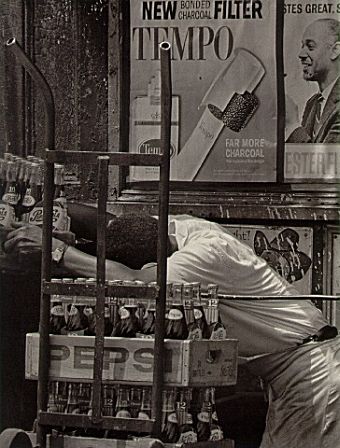
Roy DeCarava
_______________________
The Iron Cheer of Empire
Joe Bageant
It may be my bias, or my imagination, or my distaste for toil, but from here America looks like one big workhouse, "under God, indivisible, with time off to shit, shower and shop." A country whose citizens have been reduced to "human assets" of a vast and relentless economic machine, moving human parts oiled by commodities and kept in motion by the edict, "produce or die." Where employment and a job dominates all other aspects of life, and the loss of which spells the loss of everything.(....)
But you won't hear anyone complaining. America doesn't like whiners. A whiner or a cynic is about the worst thing you can be in the land of gunpoint optimism. Foreigners often remark on the upbeat American personality. I assure them that our American corpocracy has its ways of pistol whipping or sedating its human assets into the appropriate level of cheeriness.
Appearing cheerful is vital in a society where all of life monitored by an employer, a credit rating bureau or the media's projection of the world, and mediated by the financialization of life's every aspect.(....)
... the truth is that we are all very commonly issued products of a profit driven workhouse where no human commons is allowable, lest the workers find meaning and joy in each other as human beings, and perhaps become less work driven, less productive and less profitable. Best that their live remain mediated, disembodied from the great commons of the human spirit, unmoored from the great natural commons binding all living things called Earth --...(more)
_______________________
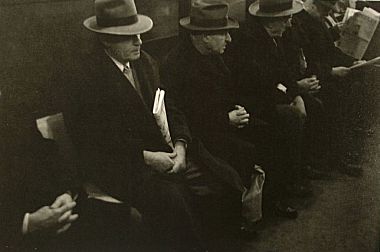
Roy DeCarava
_______________________
Slaves of Fashion
Ann Lauterbach
Bad poetry, I would submit, asks questions, raises issues, makes complaints, marks territories. Bad poetry does not take on the more difficult task, where the question and its answer are as one. Good poems absorb into their formal and imaginative resources new questions which are as "difficult" to answer as they are to raise. Or put it this way: the poem is an answer to a question or questions no one, including the poet, had thought to ask. These questions are always in temporal, historical flux, responding to myriad collisions of information from every possible-and they seem to multiply by the day-domain. The poem as answer to an unasked question puts pressure on the poet to be alert, vigilant, receptive, not just to the past, but to the weathers, internal and external, which characterize the day- poems of our climate, indeed. The burden of knowledge is immense, but it is also messy and malleable; each time you reread "Notes Toward a Supreme Fiction," a new fiction will arise and the nature of it supremacy (its bestness) will alter. It is the critic's job to ask the question or questions which the poem elicits in its answering. As long as editors and critics are blind-sided by the myopia of their pre-existing conditions for good, better and best (the latter a test only time can take), as long as they mistake subject for content, content for meaning, an form for that which is what was, much of the best of the best will remain invisible, and the real questions to their answers will go, as Shelley foretold, unacknowledged.
A rose, after all, is still only a rose, but it smells sweeter when there are three of them....(more)
_______________________
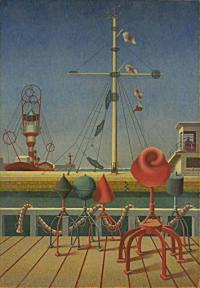
Signals
Edward Wadsworth
b. Oct. 29, 1889

The Octagon
former New York City Lunatic Asylum
Roosevelt Island
New York
Spiraling Out of Control:
The Greatest Spiral Stairs in the World
Atlas Obscura
_______________________
Memory and forgetting in the digital age
Yadin Dudai
reviewing Total Recall: How the e-memory revolution will change everything by Gordon Bell and Jim Gemmell and Delete: The virtue of forgetting in the digital age by Viktor Mayer-Schönberger
New Scientist
Just as Molière's bourgeois gentleman spoke in prose without being aware of it, most of those who fear forgetting do not realise that they have amnesiphobia. But perhaps this tiny lexical blind spot is not important any more. Amnesiphobics, unite and rejoice: Gordon Bell and Jim Gemmell (and Bill Gates, in his enthusiastic introduction) now inform us that we need never fear forgetting again. Total recall is around the corner. But alas, in such a world, even our phobia of forgetting cannot be forgotten....(more)
_______________________
Echolalias: On the Forgetting of Language
Daniel Heller-Roazen
Perhaps the infant must forget the infinite series of sounds he once produced at the "apex of babble" to obtain mastery of the finite system of consonants and vowels that characterizes a single language. Perhaps the loss of a limitless phonetic arsenal is the price a child must pay for the papers that grant him citizenship in the community of a single tongue.
Do the languages of the adult retain anything of the infinitely varied babble from which they emerged? If they did, then it would be only an echo, since where there are languages, the infant's prattle has long ago vanished, at least in the form it once had in the mouth of the child who could not yet speak. It would be only an echo, of another speech and of something other than speech: an echolalia, which guarded the memory of the indistinct and immemorial babble that, in being lost, allowed all languages to be.
pdf hereaaaarg - free reg. req.
_______________________
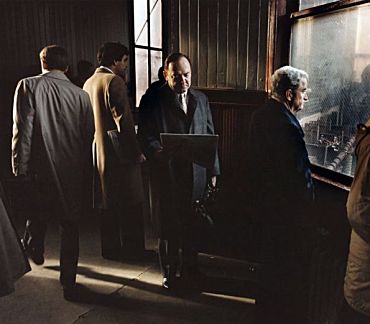
My Father Commuting
Summit, NJ, 1984
Doug DuBois
via riley dog
_______________________
Triple Canopy, Issue 7
Urbanisms: Master Plans
As the economy has collapsed, the foreclosure crisis has metastasized, and the systems of finance that powered the global construction boom have degenerated, we’ve come to see the past few decades as an agreeable daydream—of what could be bought, what could be built, and what could be justified. For so many people in America and elsewhere, those years were a reverie of easy credit and adjustable-rate mortgages, masking stagnant wages and yawning inequality.
All that fictitious money left its factual mark in the soil; the scaffolded remainders of hallucinated wealth surround us. Of course, the built environment is irreducible to a single point or a single analysis: Cities are accretions of what is designed and what is improvised, what is chosen and what is received, what is imagined and what is experienced. Likewise, the concept of urbanism now exceeds any fixed notion of the twentieth-century city, encompassing informatics and third-world slums, megachurches and office towers, master-planned Arizonan eco-cities and subterranean Chinese malls.
Over the course of this issue, Triple Canopy will continue to address these tensions and the spaces and lives they’ve produced, examining our current urban situation and what lies beyond it: the city’s past and its future; the suburban, the exurban, the frontier. _______________________
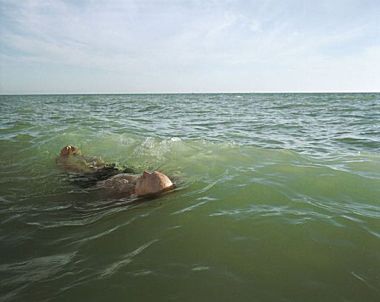
My Father In The Ocean
Naples, FL, 2006
Doug DuBois
_______________________
Nick Piombino on David Bromige
Preparing for this celebration I came across a poem in his book The Harbormaster of Hong Kong called Lines. The poem consists of a series of short poems in a call and answer mode, like this: "a poem should not mean but be [underlined]whereas the opposite is true [below the line], club universe [underlined] before the universe club you [below the line] kiss me quick[underlined] too late[below the line] unconscious [underlinesd] we have only the present moment to be unconscious in [below the line] life is brief [underlined] it says here [below the line]" Only after rereading this work the other day did I realize what an influence this poem had on my series of aphorisms titled Contradicta that I have been writing for several years now....(more)
_______________________
English Spoken Here
How globalization is changing the Indian novel.
Chandrahas Choudhury
Foreign Policy
... globalization has spawned a kind of hackneyed Indian (really, South Asian) novel that, even as it tells a story, acts as a primer on Indian and Pakistani history, politics, and culture, self-consciously offering bits of potted history and contextual explanation that seem absurd coming from characters rooted in a particular world. Such novels typically use history as a crutch, pegging their tales to wars of independence, revolutions, famous assassinations, or other public events. But for all their epic canvas, they are often novelistically banal and unambitious, content for the most part to repeat the familiar gestures of an enervated realism. The result, in books like Manil Suri's The Age of Shiva (2007) or Ali Sethi's The Wish Maker (2009), is homogenized, almost cynically calculated works that inhibit the power of the novel to illuminate a particular view of life or moment in history, and that seem, like any other consumer good, to want to stupefy rather than activate the imagination and intelligence of the receiver.(....)
The response of Indian critics to the so-called global novel has frequently been to invest the fiction of regional (or in Indian parlance "vernacular") Indian languages with the magic tag of "the authentic." But this perspective itself is an instance of simplistic binary thinking. Not all Indian writing in English panders to a Western audience or reduces the gold of Indian life into the base metal of English; nor does all vernacular literature deserve the aesthetic label of authenticity.
India is so multilingual and multicultural that it might be more truthful to think of every Indian novelist, whether writing in English, Urdu, Hindi, Tamil, Bengali, Kannada, Telugu, or Gujarati, as a kind of translator. No novelists, whatever language they work in, can be said presumptively to be "authentic," as they sometimes are in the literary-critical wars in India today. Rather, novels earn their authenticity through their attention to specific details of character and situation and through the ingenuity of their problem-solving....(more)
_______________________
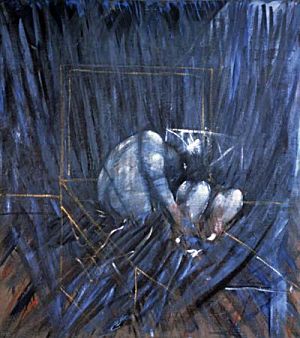
Francis Bacon
(28 October 1909 – 28 April 1992)
264 images
_______________________
Conversation Among the Ruins
Sylvia Plath
Through portico of my elegant house you stalk
With your wild furies, disturbing garlands of fruit
And the fabulous lutes and peacocks, rending the net
Of all decorum which holds the whirlwind back.
Now, rich order of walls is fallen; rooks croak
Above the appalling ruin; in bleak light
Of your stormy eye, magic takes flight
Like a daunted witch, quitting castle when real days break.
Fractured pillars frame prospects of rock;
While you stand heroic in coat and tie, I sit
Composed in Grecian tunic and psyche-knot,
Rooted to your black look, the play turned tragic:
Which such blight wrought on our bankrupt estate,
What ceremony of words can patch the havoc?
_______________________
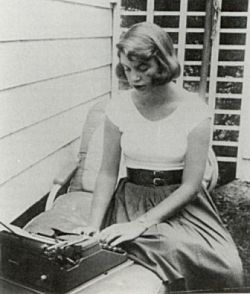
Sylvia Plath
(October 27, 1932 – February 11, 1963)
The Poetry of Sylvia Plath
_______________________
1989!
By Timothy Garton Ash
... in a classic Rankean advance of historical scholarship, we know more than we did at the time about these traditionally documented areas of high politics. By contrast, we have learned little new about the causes and social dynamics of the mass, popular actions that actually gave 1989 a claim to be a revolution, or chain of revolutions.
I spent many hours of my life standing in those crowds, in Warsaw, Budapest, Berlin, and Prague; their behavior was both inspiring and mysterious. What had moved these individual men and women to come out on the streets, especially in the early days, when it was not self-evidently safe to do so? What swayed them as a crowd? Who, in Prague, was the first to take a key ring out of his or her pocket, hold the keys aloft, and shake them—an action that, copied by 300,000 people, produced the most amazing sound, like massed Chinese bells?...(more)
Cynicism Threatens to Destroy Gains of 1989Adam Michnik To this day, books are published that contest the meaning of the transformation. Their authors believe that people are furious that nothing succeeded; that the last 20 years have been nothing but an accumulation of disaster and mistakes. It is true that not everything was perfect, but I have exactly the opposite view. Many bad things happened, but I have the feeling that, with the exception of the Balkans and Russia, the post-communist countries have not had such a good 20 years in their modern history; or in Poland's case, not in the last 300 years....(more)
via Jim Johnson
_______________________
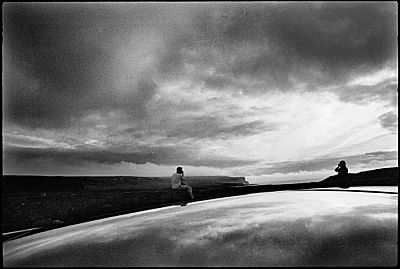
Ireland- from the side of the road
Rémi Lagoin
1.1
_______________________
In Praise of The Crack-Up
Jeanette Winterson
Such an enquiry is not academic. My creativity pulled me out of a hopeless childhood, and gave my life meaning and shape. But I have always had various forms of manic depression, (just can't bring myself to call it "bipolar"— whoever invented that dismal term must have been uni-polar—a condition I define as being permanently tethered to the banal). But I mostly managed, and, of course, creative people get away with bad behavior. We aren't expected to conform, so our social pathologies —the drink, drugs, failed love affairs, crashed cars, rages and tantrums—are not much questioned by society, and in any case, have entertainment value. Where would we be without Amy Winehouse cracking up for us or Jasper Johns rolling himself and his lovers across his paint-charged canvases?(....)
The strange thing about creative work is that it can have enormous value for others while its maker is left ravaged. The ancient Greeks understood this as the price of an encounter with a god—the divine forces enter the human and use him or her as an instrument, only to be ultimately destroyed. But I do not believe that creativity is destructive or divine. I believe it is the part of us that gives shape and voice to our innermost reality.
This is frightening. Encounters with the real, in particular what we really feel, are something we generally try to avoid. Art mediates the encounter, allowing us to get nearer to our longing and our loss, to risk more, to dare more. Yet for the maker, the exposure is not mediated; it is total and terrifying. That is why so many creative people cut themselves off from their own experience, using drugs or drink or sex or shipwreck to avoid absolute exposure to the pain of creativity. When Whitman turned to face his dark angel, to wrestle with himself, he was acknowledging his own loss, his own longing, his own unstaunched wound....(more)
_______________________
The center of gravity, I suspect, will instead lie with individuals such as Palin and Huckabee and Gingrich, media personalities like Glenn Beck and Rush Limbaugh, and activists at town halls and tea parties. Some will lament this -- but....
-
William Kristol

Kristol began working out years ago what the last, few fusspot remnants of the Old GOP seem to only now be dimly perceiving: that there is absolutely nothing left inside the Party of Lincoln but crazy, and if you want to hang onto those sweet-sweet “Conservative pundit” paydays, you’d better cozy up to the rabid Cheney Regime Dead-Enders most ricky-tick.
- driftglass
_______________________

photo - mw
_______________________
I Am Vertical
Sylvia Plath
But I would rather be horizontal.
I am not a tree with my root in the soil
Sucking up minerals and motherly love
So that each March I may gleam into leaf,
Nor am I the beauty of a garden bed
Attracting my share of Ahs and spectacularly painted,
Unknowing I must soon unpetal.
Compared with me, a tree is immortal
And a flower-head not tall, but more startling,
And I want the one's longevity and the other's daring.
...(more)
_______________________
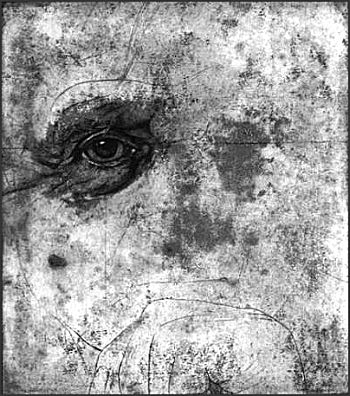
The Wall: Portrait of Francis Bacon
detail
full size here
Scattergood Moore
_______________________
Note: typos have been corrected in Berryman's Dream Song 41 posted below.
Thanks to languagehat
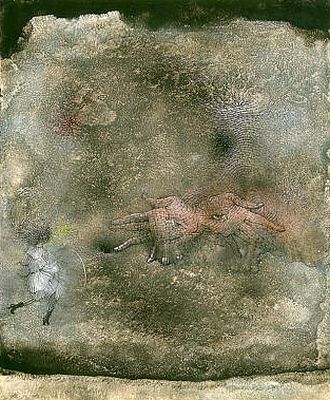
Child and Seeing Hands
Hans Bellmer
c. 1950
Hans Bellmer in The Art Institute of Chicago:
The Wandering Libido and the Hysterical Body
.....................................................
Hans Bellmer
Tom Clark
Vanitas Magazine
Why does Bellmer's
art express so well
the fallenness of men
their living under this spell
as if out of each one
had come another
who walks beside that one
and bears that one's name
but feels nothing
...(more)
_______________________
It Must Be Sophisticated
John Ashbery
There are attics in old houses
where doubt lingers as to the corrosive
effect of night-blindness: namely
are its victims directly linkable to a chain
of events happening elsewhere? If so,
we should shrug off resemblances
to our line of work. ...
(....)
...
Back when they'd send for you
once they got a house built, it was clever
to hedge your bets and produce a fraternal twin
made of bedclothes with a mop for a wig
while you scaled the wall on a rope ladder
to be the next new thing that thinks
and cautions others not to. Far from the
inner city cry of conflicting attitudes, one fled with one's
holy illusions intact, one's misconceptions too, until the whole
mindset took on a largely symbolic
look, an indifferent jewel, toy
of the weather, of successive washes of light,
I can hardly believe I'm here
in this tiny republic carved out of several conflicting
principalities. It's enough, perhaps, that I was questioned
at the edge of my performance. That now I'm safe
from my own sang-froid and scores of others,
that mere forgetfulness can save up to fifty-three lives,
that they can share your power and go on glancing
upward. Because after all we were the three
original ones, the president, vice-president and treasurer
of our class. And were formed to repay
what obscure debt and be summarily
taken out of school and handed over to our parents.
It's what matters then, and after. No one
says you have to live up to principles; indeed, what are they?
What difference does it make which one came too close
in the richly darkened theater, if all
they were after was to coax you into the light,
watch you blink a minute, and then pass on, they too,
to the larger arenas, each in the wind,
in the sand, the reeds, growing? Because even if it doesn't
punish you exactly, the thing has been
lived through, the experience sealed.
O what book shall I read
now? for they are all of them new, and used,
when I write my name on the flyleaf. Look,
here is another one unread, not written. Time for you to choose....(more)
_______________________
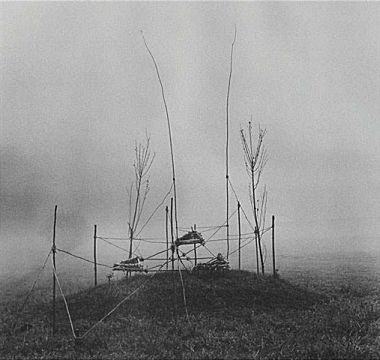
Hommage à Gustav Mahler
Chiemgau, Upper Bavaria
Germany, 1973
Nils-Udo
Environmental Art Museum
_______________________
Land Relief
"a weblog examining contemporary and historical issues in landscape architecture, urban design, environmental management, and community structure. Posts report on specific site visits, community action groups, vital design/managment methodology, and how to design for global citizenship."
_______________________
The Language in My Blood
Margaret Randall
dooneys cafe
Today I am not so sure blood doesn't bring language with it as it courses through the veins of mothers, fathers, children, grandchildren and those bound by other ties. My new sense of what language is transcends the combination of verbal sounds we use to communicate with one another. My understanding of cultural inheritance is also broader and deeper than it was back then.
At Kee Tseel, for hundreds of years in this valley rent by silver creek, people spoke. Their words did not yet hold promise of permanence or continuity; any sort of alphabet still shrouded in future. Ideas: passed from person to person, fixed themselves, pecked into rock or painted with pigments mixed from powdered roots, the juices of plants and trees, gums and animal fats. Human sensibility, here as in other parts of the world, shaped sounds that would become words, words that would fashion themselves into directives and questions and answers, sentences woven together to make stories.
The stories describe our lives. Those who inhabit the map of our living speak out or silence as they explore relationship, custom, need. It is not Babel we fear, but the stopped verb, expression cast to the sewers of modernization. Globalization of the human voice, criminally manipulated to erase or bury the language of our blood....(more)
_______________________

Nils-Udo
_______________________
Towards The Day Of Liberation
Robert Kelly
It doesnt matter what we see there
(the mouth is full of sense
no taste in listening
no sense to hear
what twists in the shallow water below the tongue)
(and if he says Listen! say
Drink the hearing with
your own ears, a word
is not to hear)
Language? To use language for the sake of communication is like using a forest of ancient trees to make paper towels and cardboard boxes from all those years the wind and crows danced in the up of its slow.
A word is not to hear
and not to say -
what is a word?
The Catechism begins:
Who made you?
Language made me.
Why did It make you?
It made me to confuse the branch with the wind.
Why that?
To hide the root.
Where is the root?
It lies beneath the tongue.
Speak it.
It lies beneath the speech.
Is it a word?
A word is the shadow of a body passing.
Whose body is that?
The shadow's own.
6 poems by Robert Kelly
from: Not this Island Music
_______________________
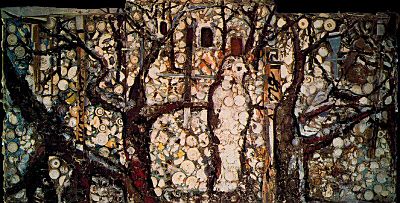 student
Julian Schnabel
b. Oct 26, 1951
_______________________
whose side are the side effects on?
Limited, Inc.
In this spot, place, lieu, here, before I lift my pen – for I write these posts before I type them, and then, in typing them, watch them shift their shapes and burdens – I feel a rush, a lunge of citations and themes, as though, in the first sentence, at the entrance of the thing, the establishing period, everything must come tumbling out (as in some dopey comedy skit in which some target character X, laugh a minute X, opens some target door Y, boobytrapped Y, and the things behind it avalanche upon him or her). For surely I’ve reached the point in this long long course of things at which (in which?) suddenly the happiness culture, more a blueprint or a Platonic form, suddenly extrudes itself into the psychoactive, chemical phantasmagoria we are all familiar with, dosed with, prescribed, stoned and high on, chained to, attuned to deep in the immune system, our biochemistry altered in its ticking and secretions by the water we drink and the incredible array of chemicals, such as were never before on earth and never before metabolized by any terrestrial organism, that we have so casually strewed about every sphere of the planet. ...(more)
_______________________
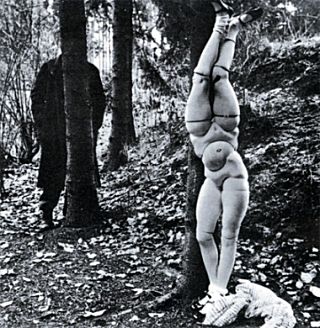
Hans Bellmer
1902 - 1975
Hans Bellmer: The Anatomy of Anxiety
Sue Taylor
google books
_______________________
Digital locks, proposed penalties, restrictions, statutory damages…what is happening to open education?
Major Concerns With Government's Anticipated Copyright Legislation
Athabasca University
.....................................................
Free Education for the Masses . . . or Not
Colin Currie
EDUCAUSE
A new political development in Canada might cause a radical change in what AU and AU Press are able to achieve and how learning content can be shared in Canada. The Canadian parliament is expected to begin discussion this fall on new copyright legislation that will limit what materials can be made freely available. According to AU Associate Vice President of Research Rory McGreal:
"The very stringent copyright laws the Canadian government is currently considering are based on a U.S. model. It would make it very difficult, particularly for open and online institutions, to make use of proprietary content. We have to look for alternatives."
A number of the proposed restrictions are seen as counterproductive at best, and destructive to Canada's standing in the world academic market at worst. One example is that all institutions would have to destroy online proprietary material within one week of a course's final exam. Another is proposed penalties for anyone who keeps digital course research documents on their computer for longer than three days. Speaking on the topic of the Canadian government's proposed new copyright legislation, AU President Frits Pannekoek said:
"Countries with wiser copyright regimes that promote educational use will catapult ahead of Canada. No longer will we be internationally competitive because of the restrictions contained in the legislation." ...(more)
EDUCAUSE
via Stephen's Web ~ OLDaily .....................................................
Who Killed Canada’s Education Advantage?
A forensic investigation into the disappearance of public education investment in Canada
Roger Martin
walrus
_______________________
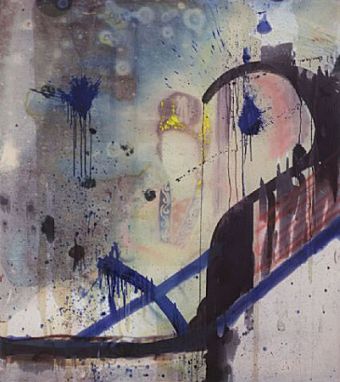
Julian Schnabel
_______________________
Dream Song 41:
John Berryman
(October 25, 1914 – January 7, 1972)
If we sang in the wood (and Death is a German expert)
while snows flies, chill, after so frequent knew
so many all of nothing,
for lead & fire, it's not we would assert
particulars, but animal; cats mew,
horses scream, man sing.
Or: men psalm. Man palms his ears and moans.
Death is a German expert. Scrambling, sitting,
spattering, we hurry.
I try to. Odd & trivial, atones
somehow for my escape a bullet splitting
my trod-on instep, fiery.
The cantor bubbled, rattled. The Temple burned.
Lurch with me! phantoms of Varshava. Slop!
When I used to be,
who haunted, stumbling, sewers, my sacked shop,
roofs, a dis-world ai! Death was a German
home-country.
_______________________
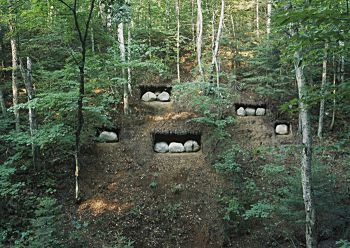
Pre-Cambrain Sanctuary
Nils-Udo
2008
_______________________
What do believers in the Absolute mean by saying their belief affords them comfort? They mean that since in the Absolute finite evil is overruled already, we may, therefore, whenever we wish, treat the temporal as if it were potentially the eternal, be sure that we can trust its outcome, and, without sin, dismiss our fear and drop the worry of our finite responsibility. In short, they mean that we have a right ever and anon to take a moral holiday, to let the world wag its own way, feeling that its issues are in better hands than ours and are none of our business.
- William James, quoted by Joseph Duemer

The Halfpenny Bridge
Dublin
John Minihan
1964
via Rhys Tranter
_______________________
A Tree Telling of Orpheus
Denise Levertov
Oct 24, 1923 - Dec 20, 1997
White dawn. Stillness.When the rippling began
I took it for sea-wind, coming to our valley with rumors
of salt, of treeless horizons. But the white fog
didn't stir; the leaves of my brothers remained outstretched,
unmoving.
Yet the rippling drew nearer – and then
my own outermost branches began to tingle, almost as if
fire had been lit below them, too close, and their twig-tips
were drying and curling.
Yet I was not afraid, only
deeply alert.
I was the first to see him, for I grew
out on the pasture slope, beyond the forest.
He was a man, it seemed: the two
moving stems, the short trunk, the two
arm-branches, flexible, each with five leafless
twigs at their ends,
and the head that's crowned by brown or golden grass,
bearing a face not like the beaked face of a bird,
more like a flower's.
He carried a burden made of
some cut branch bent while it was green,
strands of a vine tight-stretched across it. From this,
when he touched it, and from his voice
which unlike the wind's voice had no need of our
leaves and branches to complete its sound,
came the ripple.
But it was now no longer a ripple (he had come near and
stopped in my first shadow) it was a wave that bathed me
as if rain
rose from below and around me
instead of falling.
And what I felt was no longer a dry tingling:
I seemed to be singing as he sang, I seemed to know
what the lark knows; all my sap
was mounting towards the sun that by now
had risen, the mist was rising, the grass
was drying, yet my roots felt music moisten them
deep under earth.
He came still closer, leaned on my trunk:
the bark thrilled like a leaf still-folded.
Music! There was no twig of me not
trembling with joy and fear.
Then as he sang
it was no longer sounds only that made the music:
he spoke, and as no tree listens I listened, and language
came into my roots
out of the earth,
into my bark
out of the air,
into the pores of my greenest shoots
gently as dew
and there was no word he sang but I knew its meaning.
He told me of journeys,
of where sun and moon go while we stand in dark,
of an earth-journey he dreamed he would take some day
deeper than roots ...
He told of the dreams of man, wars, passions, griefs,
and I, a tree, understood words – ah, it seemed
my thick bark would split like a sapling's that
grew too fast in the spring
when a late frost wounds it.
Fire he sang,
that trees fear, and I, a tree, rejoiced in its flames.
New buds broke forth from me though it was full summer.
As though his lyre (now I knew its name)
were both frost and fire, its chords flamed
up to the crown of me.
I was seed again.
I was fern in the swamp.
I was coal.
Poems by Denise Levertov
Tesserae: memories & suppositions
Denise Levertov
google books
Breathing the water
Denise Levertov
google books
Selected poems
Denise Levertov
google books
Denise Levertov: the poetry of engagement
Audrey T. Rodgers
google books
Denise Levertov Feature
Editor: Kevin Gallagher
jacket
_______________________
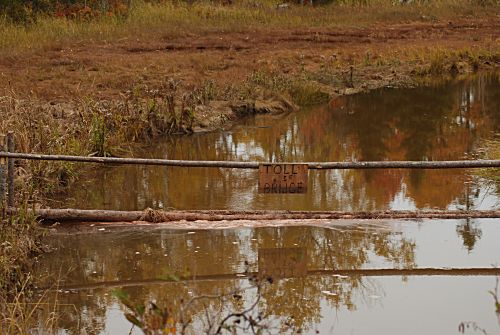
toll bridge
Cape Spear
Stephen Downes
Stephen's Web~ OLDaily
_______________________
from Linda Perdido
Mac Wellman
EXPLORINGfictions
Her soul is anthracite, his is of zinc; the conversation is all crazy eights, tetchy, and often catadioptric. A whiff of cannabis reaches high flying birds– ducks, pigeons, and of course the little known Perdido Macaw, so rare and metaphysical that the creature’s namesake is, herself, unaware of this creatured fact. (Not quite the namesake as the bird was named for Honor and Hope, twin daughters of a distant relation, Carter Fenelon Perdido, a professor at the Department of Avian Studies at Glorious Morning College in Cananga; long dead but dearly remembered by his disciples at the Ganymede Foundation.
The lovers’ collective vocabulary: Forty-six words; the central object in their over-wandering of Set County and beyond: Maximumification of the state of cool; knowledge of the finer points of balloon navigation: Hazy at first, hazy at best; the state of provisioning as of this moment: Half a dozen ham and cheese sandwiches on rye toast, two Granny Smith apples, a smallish but inordinately fuzzy pink peach, a carton of slimjims, a gallon of spring water from over in Vandalia, and a case of Blitz beer in aluminum cans (with the irate black-tufted Malabar squirrel on the label; irate and like Narthex, zinc of will, gazing knowingly and hard directly into the eye of the would be imbiber; plans for the future: Vague at best, indefinite; religious sensations: Eleusinian, priapic (loosely defined), satanic; their proximate destination: Rattlesnake Mountain Lodge in the High Sierra where the two bad ones envisage another swath of desecration and demolishment at Camp Wounded Bear, a summer institute for advanced study of the Book of Mormon and the golden questions, the playing of Bugles and other Horns; (first) secondary destination: Loon Lake on Matapan Peninsula near the Velvet Sea, a place said to harbor myriad penitent and initiates– many of them old pals of Narthex from his days in the reformatory at Weasel– at the Temple of Lower Motorcycle; (second) secondary destination: Proboscis Island in Smoke Top Bay, Each Sandwich County, and in especial, the upper slopes of Old Moldy where there is to be found a certain medicinal herb, Pheronacea or Gag’s Periwinkle, said to possess spectacular powers of enhancement in the mental realms of sparkle, dazzle and total pizzaz; (third) secondary destination: The animal shelter at New Gradual, Montana, where it is hoped pet adoption might be arranged for, in order of preference: A fennec, an Osborne’s Owlet (the blood-orange variety), and, or, a Jupiter Beetle from Kalimantan said to be able to change colors, imitate rhythmically and in various radiant Coleopteran registers the Top Ten pop tunes of any given moment; tertiary destination: The holy city of Bing in Bandana County (apparently near Laos on their map, a Ziegfield Projection based on the dubious propositions of “Lateral Thinking”) where Bhang may be purchased in bulk at a reasonable cost depending on the current exchange rate of the Beng, a black-market currency unofficially official in that errant place of untamable hoydenry, maniacal hubbub, black lizards (always irresistible for our irrepressible girl); ultimate destination, barring instantiation of the higher (as opposed to the lower) Unseen– the cave known as Morocco’s Lair said to be located behind the false wall, in an unknown closet, adjoining the antique bathroom at the Inn of the Zinn of Mohocs on the occult or hidden side of the hypothetical planet(oid) Blue Streak whose maddening and rubbery orbital periodicity is such that the object never emerges from behind the moon; their purpose in regard to this last: To ascertain the truth of what is said about this feature of Blue Streak, namely Morocco’s Lair, at the Temple of Higher Motorcycle by certain of the higher priests; and what precisely is this something that is alleged to have been said?...(more)
_______________________
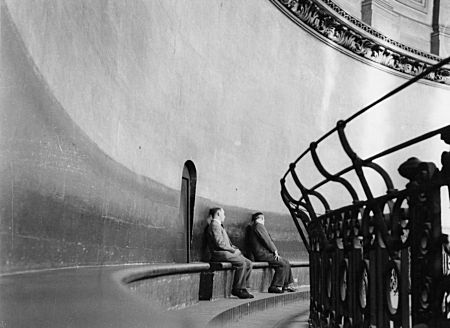
The Whispering Gallery
St Pauls Cathedral
John Minihan
London, 1963
_______________________
A Young Girl
Edith Sitwell
Is it the light of the snow that soon will be overcoming
The spring of the world? Ah no, the light is the whiteness of all the wings of the angels
As pure as the lily born with the white sun.
And I would that each hair on my head was an angel, O my red Adam,
And my neck could stretch to you like a sunbeam or the young shoot of a lily
In the first spring of the world, till you, my grandeur of clay,
My Adam, red loam of the orchard, forgetting
The thunders of wrongs and of rights and of ruins,
Would find the green shadow of spring beneath the hairs of my head, those bright angels,
And my face, the white sun that is born of the stalk of a lily
Come back from the underworld, bringing light to the lonely:
Till the people in islands of loneliness cry to the other islands,
Forgetting the wars of men and of angels, the new Fall of Man.
courtesy of Ben Friedlander, The Center of Modernism (Not)
_______________________
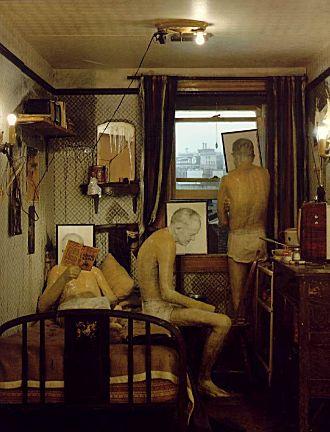
Edward Kienholz
1927 – 1994
_______________________
Protest as Embodied State Practices:
An Examination of Hegemonic and Counter-Hegemonic Protest Tactics
Sabrina Alimahomed and Jake Alimahomed-Wilson
Institute for Anarchist Studies
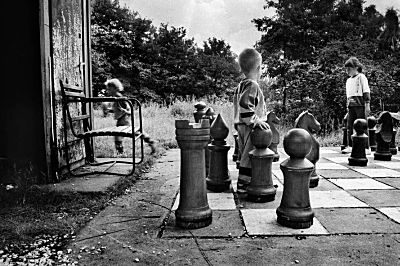
Zoltán Vancsó
_______________________
Memoirs of the blind
- The Self-Portrait and Other Ruins
Jacques Derrida
Translated by Pascale-Anne Brault and Michael Naas
available at aaaarg here
free reg. req.
I write without seeing. I came. I wanted to kiss your hand . ... This is the first time
I have ever written in the dark . .. not knowing whether I am indeed forming letters.
Wherever there will be nothing, read that I love you.
-
Diderot, Letter to Sophie Volland, June 10, 1759
- Do you believe this [vous croyez] r You'll observe that from the
very beginning of this interview I've had problems following you. I remain
skeptical ...
- But skepticism is precisely what I've been talking to you about:
the difference between believing and seeing, between believing one sees
[croire voir] and seeing between, catching a glimpse [entrevoir]-or not.
Before doubt ever becomes a system, skepsis has to do with the eyes. The
word refers to a visual perception, to the observation, vigilance, and attention
of the gaze [regard] during an examination. One is on the lookout,
one reflects upon what one sees, reflects what one sees by delaying the
moment of conclusion. Keeping [gardant] the thing in sight, one keeps on
looking at it [on fa regardel. The judgment depends on the hypothesis. So
as not to forget them along the way, so that everything be made clear, let
me summarize: there would be two hypotheses.
- You seem to fear the monocular vision of things. Why not a single
point of view? Why two hypotheses?
The two will cross paths, but without ever confirming each other,
without the least bit of certainty, in a conjecture that is at once singular
and general, the hypothesis 0/ sight, and nothing less.
- A working hypothesis? A purely a~ademic hypothesis?
- Both, no doubt, but no longer as suppositions (a hypothesis, as its
name indicates, is supposed, presupposed). No longer beneath each step,
therefore, as I set out, but always out ahead of me, as if sent out on reconnaissance:
two antennae or two scouts to orient my wanderings, to guide
me as I feel my way, in a speculation that ventures forth, simply in order
to see, from one drawing to the next. I am not sure that I want to demonstrate
this. Without trying too much to vert/y, my sights always set on
convincing you, I will tell you a story and describe for you a point of view.
Indeed the point of view will be my theme.
- Shall I just listen? Or observe? Silently watch you show me some
drawings?
_______________________

David Bromige
(October 22, 1933 – June 3, 2009)
Photo by James Garrahan
They Gain Control of My Tongue
David Bromige
Which is to say, in lieu
Of playing the blue-tinted guitar,
A sociology of this process
Offers its studies of color.
The imagination
In complete autonomy
Disregards known outcomes
Now mounting into thousands
Because millions are incredible,
All those unwasted lives
Whose right companion , well....
Yes, a dead lion feeds bees,
Its rot is sweet, sweet
And unbreathable.
An objection
To test the hope eternal
In a prehistoric ploy
On the part of that great historian,
The gang. They sit there
Ordering the $3.99 breakfast
At three in the afternoon
(That terrible three in the afternoon
Standing for your incessant woe)
Chaired by Chuck Custer,
An obvious leader.
And history as tribes native
To a landscape all-too-familiar
In the Torah of Regret
Live on mistake, mistake
That doesn’t exist in California,
Whose holy ones banished it.
Yet the line at the DMV keeps shuffling
Toward validations
Required if control
Is to exist in a church spire.
Sit down I think I love you
That causes you to stalk out
Of every channel we click to.
Explode the car.
Ten Poems
David Bromige
from As In T as in TetherBromige feature at Jacket
Edited by Susan Gevirtz
_______________________
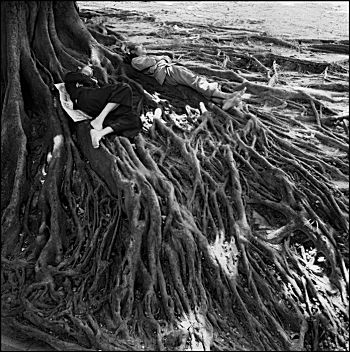
Questions to my father
Werner Bischof
zone zero
_______________________
M/C Journal Vol. 12, No. 4 (2009)
Climate and Culture
Calculating Interests: Climate Change and the Politics of Life
Emily Potter
M/C
There is a moment in Al Gore’s 2006 documentary An Inconvenient Truth devised to expose the sheer audacity of fossil fuel lobby groups in the United States. In their attempts to address significant scientific consensus and growing public concern over climate change, these groups are resorting to what Gore’s film suggests are grotesque distortions of fact. A particular example highlighted in the film is the Competitive Enterprise Institute’s (CPE—a lobby group funded by ExxonMobil) “pro” energy industry advertisement: “Carbon dioxide”, the ad states. “They call it pollution, we call it life.” While on the one hand employing rhetoric against the “inconvenient truth” that carbon dioxide emissions are ratcheting up the Earth’s temperature, these advertisements also pose a question – though perhaps unintended – that is worth addressing. Where does life reside? This is not an issue of essentialism, but relates to the claims, materials and technologies through which life as a political object emerges.
The danger of entertaining the vested interests of polluting industry in a discussion of climate change and its biopolitics is countered by an imperative to acknowledge the ways in which multiple positions in the climate change debate invoke and appeal to ‘life’ as the bottom line, or inviolable interest, of their political, social or economic work. In doing so, other questions come to the fore that a politics of climate change framed in terms of moral positions or competing values will tend to overlook. These questions concern the manifold practices of life that constitute the contemporary terrain of the political, and the actors and instruments put in this employ. Who speaks for life? And who or what produces it? Climate change as a matter of concern (Latour) has gathered and generated a host of experts, communities, narratives and technical devices all invested in the administration of life. It is, as Malcom Bull argues, “the paradigmatic issue of the new politics,” a politics which “draws people towards the public realm and makes life itself subject to the caprices of state and market”. ...(more)
_______________________
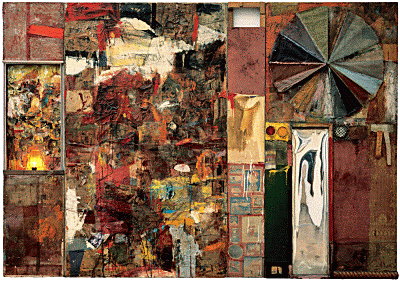
Charlene
Robert Rauschenberg
b. Oct. 22, 1925
_______________________
"Once…"
David Bromige
Once in a dream of Meaning Meaning drifting came
into a mise-en-scene I thought Saskatchewan
or thought some extra holding up a cue-card
that said it was, as in another part of Shakespeare
We rejoice for the brown grass or simpler,
the hour itself, the first flakes named at all
because they hint of a prior fall, the prairie
white with it, the soft inviting banks
beside where the hiway is becoming inaccessible.
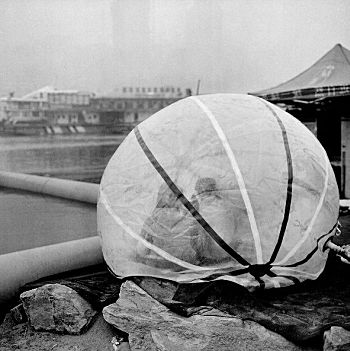
Muge
_______________________
Champdieu
Bernard Noël
translated by Eléna Rivera
the proportions at times prompt the sky to think
the garden therefore is in the open head
to look is to see the interior view
the long fold stirs according to the hidden
which comes to the edge of form a white shadow
the boxwood knows that better than us it builds
by ardor of the line springboards for the eye
the infinite sets itself thus within reach
the tree is always of life or of knowledge
from the moment where the sap of breath appears
it isn’t important to have a green thumb
but to be able to bring through the branches
this flowering of air that we call being
Three Poems from The Rest of the Voyage
Bernard Noël
translated from the French by Eléna Rivera
Conjunctions
_______________________
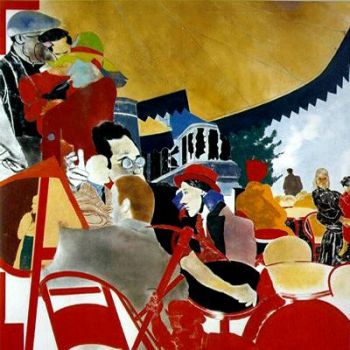
The Autumn of Central Paris
(after Walter Benjamin)
R. B. Kitaj
Second diasporist manifesto (a new kind of long poem in 615 free verses)
R. B. Kitaj
google books
_______________________
The Rumpus Interview with Alasdair Gray
I began by thinking that MacDiarmid was more a poet of sound than sense. Then, having read some of his earlier lyrics, I found to my amazement that I couldn’t forget them. If it had been mere sound, I wouldn’t have remembered them. Gradually, saying “The Watergaw,” I started to think, wait, I know what he’s talking about! [Quotes from MacDiarmid's “The Watergaw”]:
Ae weet forenicht i’ the yow-trummle
I saw yon antrin thing,
A watergaw wi’ its chitterin’ licht…
[Gray interupts himself: "Or is it “glimmering" licht?"]
Ayont the on-ding.
And I’m thinking, I know what he means! It took a wee bit. The “on-ding” is a word for an on-blast of weather coming into your face. So if you’re seeing something beyond the on-ding, it’s beyond a snow storm or water. “Watergaw” is the name for a water rainbow, the kind of rainbow that forms in a mist of falling water.
Then [the narrator] thinks of this look that was given to him by somebody dying. I used to think it was by a woman, but it was actually his father. “An’ I thocht o’ the last wild look ye gied/ Afore ye deed!” The thought is of a dying person looking at you and meaning something, and not knowing what the meaning is, but knowing that there’s meaning.
Somebody is going out, like a light bulb, out, and they’re looking at me, and they know I know it, but they’re away and there’s nothing to be said. Then there’s this feeling, in bad weather, of suddenly seeing this water rainbow and thinking that it means the same thing that was meant by the dying father’s glance, or a dying anybody’s glance.
The other thing you’re finding is that there was an old Scottish speech, which I use myself. He grew up in a community where there was much old Scottish speech used. But he also mined the dictionaries of the older Scottish speech. “Aye, that’s a good one.” “Yes, use that!” He has actually restored quite a lot of meaning to Scottish words that people had forgotten....(more)via the Literary Saloon
Alasdair Gray: Works
Sorcha Dallas Contemporary Art
_______________________

Dizzy Gillespie
b. Oct. 21, 1917
and Ted Wilson
Lisette Model
c. 1954
_______________________
An Interview with Suzanne Jill Levine
author of The Subversive Scribe
“What a loss to readers, and how unfair to the translator, that readers are not aware of what we experience, of how complex the process is and how it reveals the literary critic and scholar in the good translator.”
_______________________
Shout About It from the Housetops
Kurt Vonnegut
previously unpublished
vanity fair
_______________________
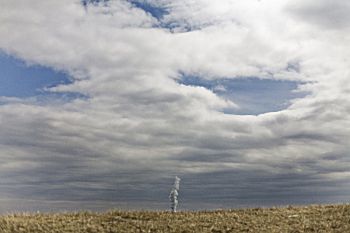
In The Wake of an American Dream
Ross Mantle
via Joerg Colberg
_______________________
Marching Toward Zombieland
When sober-minded individuals begin to regard an enterprise within a nation as "an enemy of the people" you can bet that some serious blood is going to flow. This is now essentially the situation for the Goldman Sachs company, which last week announced third-quarter earnings of over $3 billion largely derived from converting zero percent loans from taxpayers into zero risk profits off of anything paying more than zero percent in interest, revenue, or dividends.
The "people" across this big country may not have a clue how any of this is done, and there may be much to fault them on from the care-and-feeding of their own bodies to the content of their dreams, but you can't argue with the fact that they are heavily armed to an extreme. And although it may be hard to measure with precision, one might venture to state that they are increasingly pissed off. How else explain popular entertainments like "Zombieland?"(....)
The sense that Wall Street has pulled off a coup d'etat and taken over the machinery of the United States is the most powerful meme out there now, and its power is growing in magnitude every day among all classes of Americans. I can't say how much it reflects reality. Even if it is a result of sheer happenstance - the tragic evolution of an industrial economy into a financial finagling economy - the citizens will still experience it as a stealing of their future. Whatever else one might say about American culture, it is keenly attuned to a sense of heroes and villains. We take great pride in our ability to blow away the bad guys. And life imitates art, as Oscar Wilde observed. If a zombie virus is on the loose in America, the first infections showed up in the zombie banks, among the zombie bankers. Watch out, Lloyd Blankfein! Woody is on his way.......(more)
_______________________

Muge
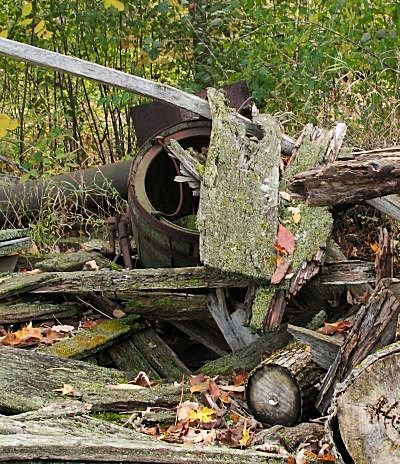
photo - mw
_______________________
from
The Slop Barrel: Slices of the Paideuma for All Sentient Beings
Philip Whalen
(....)
III
By standing on the rim of the slop barrel
We could look right into the bird's nest.
Thelma, too little, insisted on seeing
We boosted her up
and over the edge
Head first among the slops in her best Sunday dress
Now let's regret things for a while
That you can't read music
That I never learned Classical languages
That we never grew up, never learned to behave
But devoted ourselves to magic:
Creature, you are a cow
Come when I call you and be milked.
Creature, you are a lion. Be so kind
As to eat something other than my cow or me.
Object, you are a tree, to go or stay
At my bidding...
Or more simply still, tree, you are lumber
Top-grade Douglas fir
At so many bucks per thousand board-feet
A given amount of credit in the bank
So that beyond a certain number of trees
Or volume of credit you don't have to know or see
Nothing
Nevertheless we look
And seeing, love.
From loving we learn
And knowingly choose:
Greasy wisdom is better than clothes.
I mean i love those trees
And the printing that goes on them
A forest of words and music
You do the translations, I can sing. ...(more)

Philip Whalen
b. Oct. 20, 1923
The real tension, I think, is between official poetry, the kind that we're taught in school and is kept in libraries, and the kind we really believe in - what we are writing and what our friends write. The same thing holds for meditation: what we discover for ourselves and learn. At some point you can forget it and go off and make a pot of spaghetti. We used to do go down to Muir Beach years ago to gather mussels off the rocks. We'd build a bonfire, put seaweed on the fire to steam the mussels. We'd eat them, then jump up and down in the waves and have fun. That was enough. Probably enough. Or too much. Oh, I guess Blake said it, "Enough, or too much." That's all.
-
Philip Whalen, About Writing and Meditation
The collected poems of Philip Whalen
edited by Michael Rothenberg
google books
_______________________
Silence: Lectures and Writings
John Cage
available via aaaarg here
free reg. req.
Foreword
For over twenty years I have been writing articles and giving lectures. Many of them have been unusual in form-this is especially true of the lectures- because I have employed in them means of composing analogous to my composing means in the Seld of music. My intention has been, often, to say what I had to say in a way that would exemplify it; that would, conceivably, pennit the listener to experience what I had to say rather than just hear about it. 'Ibis means that, being as I am engaged in a variety of activities, I attempt to introduce into each one of them aspects conventionally limited to one or more of the others.
So it was that I gave about 1949 my Lecture on Nothing at the Artists' Club on Eighth Street in New York City (the artists' club started by Robert Motberwell, which predated the popular one associated with Philip Pavia, Bill de Kooning, et al.). 'Ibis Lecture on Nothing was written in the same rhythmic structure I employed at the time in my musical compositions (Sonatas and Interludes, Three Dances, etc.). One of the structural divisions was the repetition, some fourteen times, of a single page in which occurred the refrain, "If anyone is sleepy let him go to sleep." Jeanne Reynal, I remember, stood up part way through, screamed, and then said, while I continued speaking, "John, I dearly love you, but I can't bear another minute." She then walked out. Later, during the question period, I gave one of six previously prepared answers regardless of the question asked. 'Ibis was a reflection of my engagement in Zen. _______________________
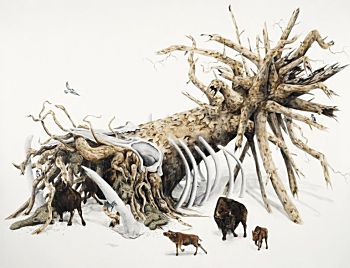
departure
The Strain of Inheritance
Ryan McLennan
Joshua Liner Gallery
via riley dog
_______________________
Raising up dead horses
Joe Bageant
No matter how you cut it, things will not be as much fun as shopping and speculative "investing" were.
The fiesta is over, the economy as we knew it is dead.
The national money shamans have danced around the carcass of our dead horse economy, chanted the recovery chant and burned fiat currency like Indian sage, enshrouding the carcass in the sacred smoke of burning cash. And indeed, they have managed to prop up the carcass to appear life-like from a distance, if you squint through the smoke just right. But it still stinks here from the inside. Clearly at some point we must find a new horse to ride, and sure as god made little green apples one is broaching the horizon. And it looks exactly like the old horse.(....)
Somewhere in the smoking wreckage lie the solutions. The solutions we aren't allowed to discuss: adoption of a Wall Street securities speculation tax; repeal of the Taft-Hartley anti-union laws; ending corporate personhood; cutting the bloated vampire bleeding the economy, the military budget; full single payer health care insurance, not some "public option" that is neither fish nor fowl; taxation instead of credits for carbon pollution; reversal of inflammatory U.S. policy in the Middle East (as in, get the hell out, begin kicking the oil addiction and quit backing the spoiled murderous brat that is Israel.
Meanwhile we may all feel free to row ourselves to hell in the same hand basket. Except of course the elites, the top five percent or so among us. But 95 percent is close enough to be called democratic, so what the hell. The trivialized media, having internalized the system's values, will continue to act as rowing captain calling out the strokes....(more)
_______________________
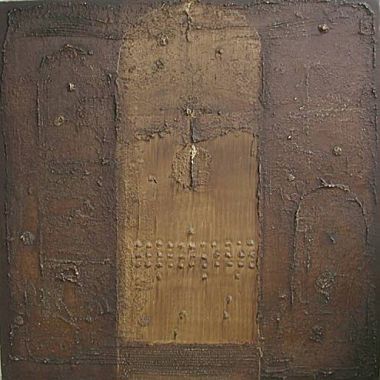
Gate
Nguyen Trung
Vietnamese Artists
Thavibu Gallery
Contemporary Art from Thailand, Vietnam and Burma
_______________________
REACH IN
Michael McClure
b. October 20, 1932
THE NUMBERS ARE ALL WRONG,
the coo and gurgle of the baby
is the equation's truth.
There are no directions, no colors,
no sights, no tastes, no sounds,
except in the shape of building the soul,
or in mating,
or in dodging the predator.
The naked, tiny, pink bird
wiggling next to the green eggs
in the nest
is aliving feast
set to dine on the cosmos and to sip
meat and nectar from the mother's beak.
No
matter
how
far
inwards
I imagine
the reaching of matter,
(till as Ouroboros it swallows
the waves of its tail),
there will still be the snail sleeping
locked in its shell
on the branch
and the smiling cat on the gravel
under a tree.
_______________________

Lazaretto riverfront
photo - David Barnes
Epidemics, Politics, and Quarantine
in the Nineteenth Century
David Barnes
In the early twenty-first century, most immigrants and foreign visitors arrive in the City of Brotherly Love through the Philadelphia International Airport, along the Delaware River at the city’s southern edge. Two hundred years ago, new arrivals from overseas “landed” at nearly the same spot: just a mile west of where the airport now stands, to be exact, in Essington, Tinicum Township. The gateway to Philadelphia for the first century of our nation’s existence was the Lazaretto quarantine station and hospital, where all arriving ships, passengers, and cargo were inspected and quarantined if necessary. (The name “Lazaretto” derives from St. Lazarus, patron saint of lepers. Maritime quarantine stations known as lazarettos were established in European port cities beginning in the late 14th and early 15th centuries.) The Lazaretto stands today as a forgotten monument to a hidden history. Recovering the history and viewing it through the prism of the site itself reveals a hitherto little-known facet of life in a nineteenth-century American seaport city....(more)
Edible Geography and BLDGBLOG have teamed up to lead an 8-week design studio focusing on the spatial implications of quarantine;
On the Other Side of Arrival: An Interview with David Barnes
Geoff Manaugh
BLDGBLOG
also
The Last Town on Earth: An Interview with Thomas Mullen
Biology at the Border: An Interview with Alison Bashford
_______________________
Vowells
Arthur Rimbaud
b. Oct. 20, 1854
A Black, E white, I red, O blue, U green: vowels,
I shall tell, one day, of your mysterious origins:
A, black velvety jacket of brilliant flies
Which buzz around cruel smells, gulfs of shadow
E, whiteness of vapors and of tents,
Lances of proud glaciers, white kings, shivers of
cow-parsley;
I, purples, spat blood, smile of beautiful lips
In anger or in the raptures of penitence;
U, waves, divine shudderings of viridian seas,
The peace of pastures dotted with animals, the peace
of the furrows
Which alchemy prints on broad studious foreheads;
O, sublime Trumpet full of strange piercing sounds,
Silences crossed by Worlds and by Angels:
- O the Omega, the violet ray of Her Eyes.
original french plus Patti Smith's review of Graham Robb's Rimbaud here
thanks Robert
_______________________

Wittgenstein Gravestone
Photograph © Andrew Dunn
"My propositions are elucidatory in this way: he who understands me finally recognizes them as senseless, when he has climbed out through them, on them, over them. (He must so to speak throw away the ladder, after he has climbed up on it.) He must surmount these propositions; then he sees the world rightly."
Wittgenstein, Tractatus 6.54
.....................................................
The object of the language game is to keep the world going.
-
Tom Clark, In the World (Wittgenstein)
_______________________

photo - mw
_______________________
from
Sourdough Mountain Lookout
Philip Whalen
(....)
BUDDHA: "All the constituents of being are
Transitory: Work out your salvation with diligence."
(And everything, as one eminent disciple of that master
Pointed out, had been tediously complex ever since.)
There was a bird
Lived in an egg
And by ingenious chemistry
Wrought molecules of albumen
To beak and eye
Gizzard and craw
Feather and claw
My grandmother said:
"Look at them poor bed-
raggled pigeons!"
And the sign in McAlister Street:
"IF YOU CAN'T COME IN
SMILE AS YOU GO BY
LOVE
THE BUTCHER
I destroy myself, the universe (an egg)
And time—to get an answer:
There are a smiler, a sleeper and a dancer
We repeat the conversation in the glittering dark
Floating beside the sleeper.
The child remarks, "You knew it all the time."
I: "I keep forgetting that the smiler is
Sleeping; the sleeper, dancing."
From Sauk Lookout two years before
Some of the view was down the Skagit
To Puget Sound: From above the lower ranges,
Deep in the forest—lighthouses on clear nights.
This year's rock is a spur from the main range
Cuts the valley in two and is broken
By the river; Ross Dam repairs the break,
Makes trolley buses run
Through the streets of dim Seattle far away.
I'm surrounded by mountains here
A circle of 108 beads, originally seeds
of ficus religiosa
Bo-Tree
A circle, continuous, one odd bead
Larger than the rest and bearing
A tassel (hair-tuft) (the man who sat
under the tree)
In the center of the circle,
a void, an empty figure containing
All that's multiplied;
Each bead a repetition, a world
Of ignorance and sleep.
Today is the day the goose gets cooked
Day of liberation for the crumbling flower
Knobcone pinecone in the flames
Brandy in the sun
Which, as I said, will disappear
Anyway it'll be invisible soon
Exchanging places with stars now in my head
To be growing rice in China through the night.
Magnetic storms across the solar plains
Make Aurora Borealis shimmy bright
Beyond the mountains to the north.
Closing the lookout in the morning
Thick ice on the shutters
Coyote almost whistling on a nearby ridge
The mountain is THERE (between two lakes)
I brought back a piece of its rock
Heavy dark-honey color
With a seam of crystal, some of the quartz
Stained by its matrix
Practically indestructible
A shift from opacity to brilliance
(The Zenbos say, "Lightening-flash & flint-spark")
Like the mountains where it was made
What we see of the world is the mind's
Invention and the mind
Though stained by it, becoming
Rivers, sun, mule-dung, flies—
Can shift instantly
A dirty bird in a square time
Gone
Gone
REALLY gone
Into the cool
O MAMA!
Like they say, "Four times up,
Three times down." I'm still on the mountain.
...(more)
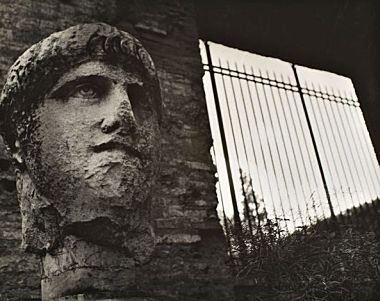
Rome
Lisette Model
1901 - 1983 Lisette Model
Photographer and Teacher
_______________________
Open Access Week
(October 19-23, 2009)
Open Access events in Ottawa
Carleton University, University of Ottawa and IDRC (International Development Research Centre) have collaborated to provide a suite of programs to celebrate Open Access Week
via Peter Suber
Open Access News
_______________________
Shadow Play
Tom Clark
(....)
Click Memory, unwanted, unexpected
Images Display; pasts come flooding in, slow,
Flicking yellow glow on endarkened wall. Hello
Interior landscape we've always
Traveled, Dear One, by a Lake of Dreams -- looking
For that light-in-window fleeting house
Now a cottage haunted by passing strangers
Who were never there. The night's cold,
Bells do not toll here at midnight any more.
...(more)
_______________________
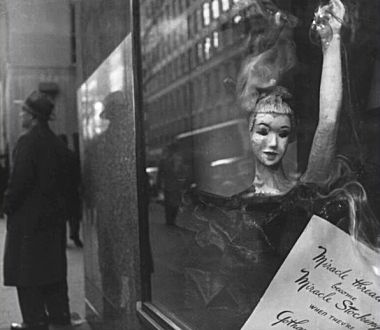
Window, New York
c. 1939-1945
Lisette Model
_______________________
101
If our life were an eternal standing by the window, if we could remain there for ever, like hovering smoke, with the same moment of twilight forever paining the curve of the hills.... If we could remain that way for beyond forever! If at least on this side of the impossible we could thus continue, without committing and action, without our pallid lips sinning another word!
Look how it's getting dark! ...The positive quietude of everthing fills me with rage, with something that's a bitterness in the air I breathe. My soul aches ... A slow wisp of smoke rises and dissipates in the distance... A restless tedium makes me think no more of you...
All so superfluous! We and the world and the mystery of both.
-
Pessoa, The Book of Disquiet
_______________________
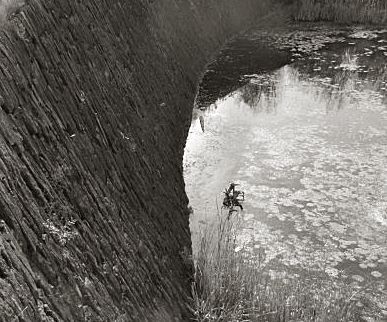
photo - mw
_______________________
Sliding Trombone
Georges Ribemont-Dessaignes
translated by David Gascoyne
I have a little windmill on my head
Which draws up water to my mouth and eyes
When I am hungry or moved to tears
I have a little horn full of the odour of absinth in my ears
And on my nose a green parakeet that flaps its wings
And cries 'Aux Armes'
When from the sky fall the seeds of the sun
The absence from the heart of steel
At the bottom of the boneless and stagnant realities
Is partial to crazy sea-fish
I am the captain and the alsatian at the cinema
I have in my belly a little agricultural machine
That reaps and binds electric flex
The cocoanuts thrown by the melancholy monkey
Fall like spittle into the water
Where they blossom again as petunias
I have in my stomach an ocarina and I have virginal faith
I feed my poet on the feet of a pianist
Whose teeth are even and uneven
And sad Sunday evenings
I throw my morganatic dreams
To the loving turtle-doves who laugh like hell.
French surrealist poetry
In English translation by David Gascoyne
_______________________
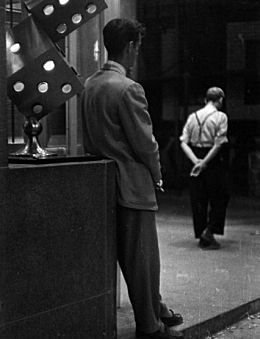
Reno
Lisette Model
1949
_______________________
Minuscule Things
William Matthews
There’s a crack in this glass so fine we can’t see it,
and in the blue eye of the candleflame’s needle
there’s a dark fleck, a speck of imperfection
that could contain, like a microchip, an epic
treatise on beauty, except it’s in the eye of the beheld.
And at the base of our glass there’s nothing
so big as a tiny puddle, but an ooze, a viscous
patina like liquefied tarnish. It’s like a text
so short it consists only of the author’s signature,
which has to stand, like the future, for what might
have been: a novel, let’s say, thick with ambiguous life.
Its hero forgets his goal as he nears it, so that it’s
like rain evaporating in the very sight of parched
Saharans on the desert floor. There, by chance, he meets
a thirsty and beautiful woman. What a small world!
_______________________

Rome
Lisette Model
_______________________
Constant Vision
Lebbeus Woods
Some time ago, I was speaking with Peter Cook, the founder of Archigram, about the Situationists and, in particular, Constant Nieuwenhuys—the artist and visionary architect—and he told me a story. “In 1959 or ’60, Mike Webb (a founding member of Archigram) and I attended a lecture given by Constant on his “New Babylon” project. We were just graduating from architecture school, but Mike leaned over to me during the lecture and whispered “we can do it better!” And so, a couple of years later, they did it at least differently, setting off a revolution in architecture that reverberates to the present day. What both Constant and Archigram did was imagine architecture as a leading instrument of social change, through the making of ideal or utopian architectural projects. The difference between them is that the projects and the ideals they expressed stand on opposite sides of a cultural divide. This takes a bit of explaining.(....)
New Babylon was inspired by and contributed to the work of the Situationists, a group of intellectuals, theorists and writers, as well as artists who were anything but Modernists in the classic capitalist mold. They were inspired by the irrational forms and practices of Dada and Surrealism, and were what we can could call neo-Marxists, meaning inspired by Marx’s vision of revolutionary socialism but seeking to use the capitalist system to achieve their ends. Guy Debord and others invented tactics such as derive, psychogeographie, and detournment, which seized upon then subverted capitalist notions to develop radical ways of living that were to culminate in revolution (Archigram first heard of these through Constant’s lecture, no doubt). Constant joined the Situationists early on and became their architect, much the same as Antonio Sant’Elia had done with the Futurists, half a century before. The spaces of New Babylon were intended to be spaces of disorientation and of reorientation, from rational, functionalist society to one that is liberated and self-inventing. It was meant to replace capitalist exploitation of human labor and emotion with anarchist celebration of them. Its architecture was to provide a complex armature on which could be woven endlessly new, unpredictably personal urban experiences, determined by ever-changing individual desires. In the end, however, the architecture of the New Babylon seemed to overwhelm such playful, radical spontaneity by its sheer weight and monumental scale.
Is Constant’s epic project of other than historical interest today? I believe it is. Aside from the visual strength and sometimes poetic nuances of his models, paintings and drawings, New Babylon raises many questions related to issues of contemporary interest. What role can architecture play in social and political change? What role should an architect take in determining the direction and character of change? How important is the design of space in the whole mix of human activity? Can design “change the world?” If so, who should control it? Constant and New Babylon can still inspire us—as THEY once did the young Peter Cook and Michael Webb—in spirit, if not in form....(more)
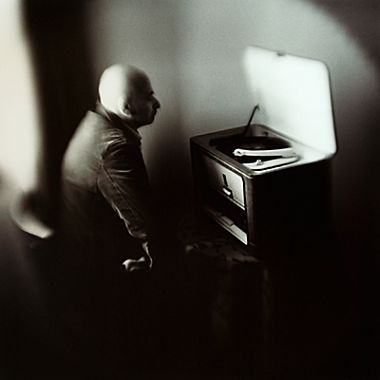
Keith Carter
_______________________
The Book Of Pleasures
Raoul Vaneigem
The long dark night of trade is all the illumination our inhuman history has ever known. It will lift as life dawns. Death stares at our passions and we mute them; we mesh our desires with what is inimical to life; and we base the greater part o f existence on the bloody search for profit and power. We have been doing it for centuries and we have had enough. We have had enough of revolutions dyed in blood by intellectuals. Violence too is changing sides.
Survival, going cheap these days in what is left of the exchange market, is the everyday production of misery, a totalitarian industry. It too is in what you call crisis, in fact the death spasm of this whole civilisation.
The only human thing this society based on commerce has made is the mould cast in parody of itself, which serves to propagate it world-wide. The fragmentation that exchange value imposes on life can only tolerate fragmented people, embryos shrivelling in society's incubators, creatures never to be masters of themselves, but slaves. Once cloaked in divinity, then fleshed in ideology, power is now revealed in its bare bones: Economics. If this carries all the bets, the game from now on must go against us.
Is it true that life makes sense because of death? Or that we have energy in order to work? That sooner or later judgement is passed on everything either by gods or men or history? That everyone has to pay in the end? For one reason or another, or even for no reason? Or is it maybe that existence is precious because nobody exists except behind "I must work" identities? All in all, do authority and money really regulate how lovers kiss or the taste for wine, or your dreams, or the smell of thyme on a mountainside, since they govem what they cost? If it is and they do, then the world is upside down, and I want to set it right....(more)
_______________________
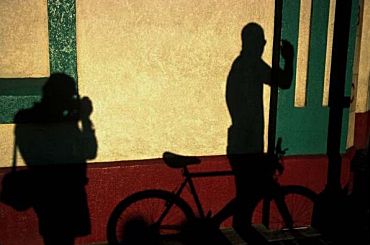
Constantine Manos
1 2
_______________________
steve dalachinsky - (evan parker @ the stone 10/13/09)
courtesy of Jim Leftwich
textimagepoem
dots
set 1 (w/ cyril baptiste)
disconnecting the dots
the idea is to disconnect the dots
deep/throat the gong-a-limbs
thru scat-loops echoing metals
melding of fractions / simultaneous monologues
inter-national enveloping esthetic
perhaps the shaking off of parallels
slight vibration & busy percussion
paddle-odium minor pandemonium moan-ium
shades of scrape-forge
neo-generated messticuffs
hot blood mingling with cool reserve
tenorocities & tambourine dance
like a horde of mad cicadas
rhythmic pitted against arrhythmic multiples
& there go those birds again
meeting dense air with their clatter & chatter
blood that flows thru the dreamer’s cheeks
disembodied voices made whole thru the berimbau’s shimmer
& here we all are froze in tropics
optical allusions
high above the bottom of the trees
thunder crunched brain-things
brew web transparencies
...(more)
_______________________
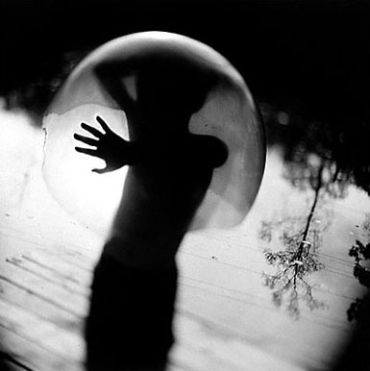
"Bubble"
Keith Carter
_______________________
Barbara Ehrenreich – a Situationist
The Situationist reviews Bright-Sided: How the Relentless Promotion of Positive Thinking has Undermined America
_______________________
Transcript
"... a bi-monthly review of books and writing from around Europe. Its aim is to promote quality literature written in the 'smaller' languages and to give wider circulation to material from small-language literary publications through the medium of English, French and German.
Transcript is published by Literature Across Frontiers, the European programme for literary exchange and policy debate, with the support of the Culture 2000 programme of the European Union. Literature Across Frontiers operates through partnership with a network of literature and translation organisations."
_______________________
Reading the World Conversation Series
Oct. 6 2009
Three Percent
Video is now up from our Reading the World Conversation Series event with the acclaimed French-to-English translator Charlotte Mandell. It’s in seven parts
_______________________
Why We Need a New History of Exploration
Lewis and Clark, Alexander von Humboldt, and the explorer in American culture
Michael F. Robinson
common-place October 2009
_______________________

Constantine Manos
_______________________
Under Arcturus
Ilpo Tiihonen
translated by Herbert Lomas
books from finland
Even in autumn, at the very beginning,
the omens were all bad:
‘Oh who can make a start with death,
after the ice we’ve had?’
But though the witches warned and spat,
they tackled their first snow-weather,
and hand in hand and side by side,
huddled close together.
Leaves had wafted, light and yellow,
in the damned dirt to lure us,
but the spruce trees stood, with spruce you see
the height ot the night, the way to Arcturus.
...(more)
|

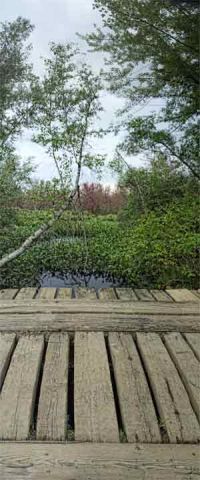
 Janus Head
Janus Head

 The Age of Briggs & Stratton
The Age of Briggs & Stratton





















































